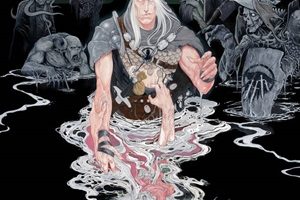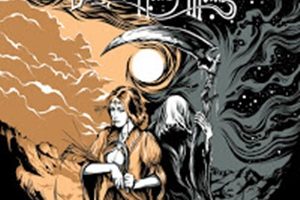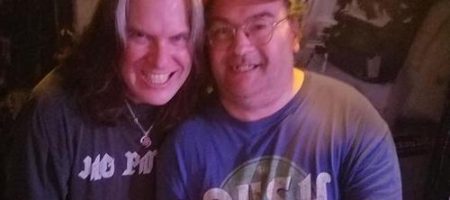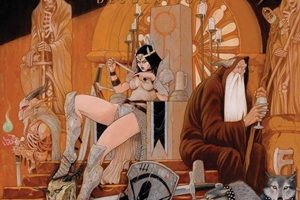Khemmis – We’re All Doomed
Friday, 1st May 2020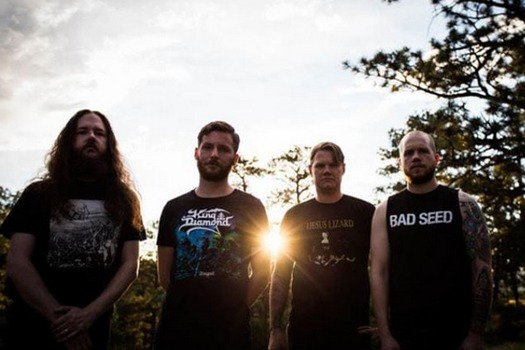
Denver, Colorado may be best known as the mile-high city – but there’s a potent metal scene brewing as well. Add Khemmis to that list of breakout acts, especially for those who are into a mix of classic metal and doom. They’ve released three full-lengths that have gained critical acclaim, and their diverse tour packages where they’ve been able to play with extreme metal acts beyond the expected more melodic groups have helped them gain a wide array of supporters.
Their latest release Doomed Heavy Metal is sort of a compilation of songs past and present that may not necessarily have been widely available in most formats- until now. We reached out to guitarist/vocalist Phil Pendergast for a fascinating conversation. He’s happy to bring us up to speed on the specific cover choices for the new record, an assessment of the band’s career, the Colorado metal scene, and some insights into the next record for Khemmis.
Dead Rhetoric: Doomed Heavy Metal is the latest Khemmis EP – a six-song affair that is a mix of covers, original material, and live renditions of favorites in the catalog. How did this release come about – as you are now on Nuclear Blast after finishing your contract with 20 Buck Spin, correct?
Phil Pendergast: As a band, we are officially just on Nuclear Blast now. It’s like an album deal, for any full-length album we are going to be just with Nuclear Blast. This specific project that we had envisioned before we had signed with the deal to go with Nuclear Blast all the way. It was always going to be something different than a full-length album release. We had recorded two live shows for back to back nights in December 2018 in Denver – the shows were called ‘Doomed Heavy Metal’. We decided that we were going to do something with the audio from these live shows.
As we’ve been biding our time, starting to write new material, we were talking with Dave from 20 Buck Spin about putting out this live material, but also putting out some of the material we put out in the past but never received a wide release. You couldn’t buy a copy or own a copy of the “Empty Throne” track that we did for Decibel magazine flexi-series, other than people that had the magazine. We did a limited 7” run of “A Conversation with Death” track, back in 2016, early 2017 I think. So some people got their hands on that. We wanted to put those out, and own them on a nice physical copy that wasn’t going to wear out as easily as the flexi-disc.
We wanted to do something new also, so it wasn’t just already recorded stuff. We thought it would be cool to try our hands on one of the more iconic tracks in the metal canon. We ultimately decided to think back to a conversation we had on our very first tour in the van where we were trying to consider covering the last track on Holy Diver by Dio, “Shame on the Night”. We talked about that forever ago, and when we revisited the idea we thought it would be fun to do something totally unexpected, and go for one of the poppiest and still true heavy metal songs, so we decided to do “Rainbow in the Dark”. That was recorded more recently, at the same time as we were mixing the live tracks.
From the very beginning we thought it would be really cool to do something like the ZZ Top album Fandango, which is a collection of half-live, half studio tracks – which explains the flow of this record.
Dead Rhetoric: How important of an artist was Ronnie James Dio in shaping your heavy metal philosophy and outlook? What have been some of your favorite memories, albums, or songs surrounding his long career?
Pendergast: I’ve always been a huge fan of the first Rainbow album, and Holy Diver, but I was not the type of person that obsessively went through his whole catalog until recently. Obviously his stuff with Black Sabbath is equally as important. I was completely unaware back in high school that Dio was in Black Sabbath, as lame as that may sound up until maybe five or six years ago. It was really a pleasant surprise to get to see the collaboration work out.
My personal favorite of the Sabbath ones is The Mob Rules – because I like the grimier attitude of that album. I think it works really well, the grittier delivery. All of the stuff he did, including Dehumanizer, I think people don’t give enough attention to that, is awesome. There’s nobody else who has a more iconic metal voice, nobody else who’s probably better, with the exception of Rob Halford, but they are so different from each other. There’s no arguing how important he is in the metal catalog. It’s really an honor to do even a song of his – and it is something that we felt that we were up to the challenge of and we were going to succeed. It feels like we did.
Dead Rhetoric: How do you feel about the arise of the band after eight years together? Does it surprise you the level of respect and success you’ve received not just from the critics but your fans as a whole?
Pendergast: Obviously it surprises me. We had such low expectations for this thing when we started it off. It was just an excuse to hang out together, drink beer and put some live riffs together. We were pretty bad at first. I think all bands are kidding themselves if they thought that they would be huge – or that anyone would give a shit- right when they started off. Our respect for each other and for our fanbase in the metal community has really only grown over time. I’m so thankful for all the chances that we have been given. To play cool festivals, to tour in interesting places, playing with some of our favorite bands- that continues to just blow my mind.
It’s really awesome to have these personal connections with people, either that we’ve never met or will meet on tour that we’ve had a life changing impact on. There are people that have said we’ve helped them save their lives, helped them sleep at night, helped them get over PTSD. Very really, important connections that we’ve forged with this music. There is nothing more rewarding out there in life, I think, than putting something of yourself out into the world, and means a lot to you and you were afraid to expose in the first place, and it hits that level with other people. That’s the most gratifying part of being in the band, period – it’s those connections we’ve made with the fans.
It’s crazy to me to see people going to the extent of getting a Khemmis tattoo – or ten Khemmis tattoos. People do that, it means a lot to me, and it might freak me out sometimes that people feel so confident to put our art on their skin. I don’t want to understate how wonderful it is to feel that level of vindication from people that love us.
Dead Rhetoric: That is very significant. When people put tattoos of your work, it brings things to another level of deep affinity for what you are doing…
Pendergast: You think about these songs – a large reflection of my metaphoric skin. These things are about things that are real, and important, and would have rather guarded from the world and myself – to see some kind of product of that become a literal part of other people’s bodies, that’s great.
Dead Rhetoric: How are decisions handled when it comes to the workload and responsibilities within the band? Especially considering you have yourself and Ben sharing the vocal and guitar duties, do you pick specific spots and know who can handle what song to song?
Pendergast: Generally, the default is that I’m doing the vocals, and my guitar part is whatever I can do and do the vocals. That part is relatively easy. Then when we start structuring out the song, figuring out where we want the peaks and valleys and sort of the dynamics of the song to be. This is the climax, the really heavy part- that might involve the idea of Ben doing the vocals for a certain part so that the song moves in the way that we are imagining. The default is always that we are writing with the melodic vocal in mind, and if there is a nasty riff and it isn’t work, or we are injecting a heavy vocal part, we go with it- so we don’t try to overthink it too much.
Dead Rhetoric: What do you think would surprise people to know about Colorado and the metal scene there? Do you believe there has always been strong appreciation not just for the national tours that roll through, but supporting the local talent in different genres there?
Pendergast: Yeah people would be more surprised to know that local shows here often attract a bigger crowd that touring shows. There can be a night at a local spot – Hi-Dive or 3 Kings Tavern – a local show with three local bands that are relatively unheard of, and that show might draw 100-150 people on a weeknight. Then you might have somebody roll through on a smaller, underground tour, death metal band or something. If they don’t have local support, they may see a smaller turnout than that local show. It goes to show that in Denver, the support of the local community is very important to the music experience and seeking live music here.
We see that people will turn out early if there is a local band on a larger show. People don’t just show up for the main act. That’s not to discourage people from touring through Denver- we have really good crowds – but I don’t think in a lot of places you see that same level of support for local music. It’s because we have a lot of good local bands, and a lot of bands that are doing unique stuff. The scene in Denver is for a band to have their own sound, and watching them evolve over time.
Dead Rhetoric: What does doom metal and heavy metal as genres mean to you personally? Did you always feel drawn to the genre even when you were younger, enough so to find like-minded people who wanted to explore their creative itch in a band?
Pendergast: I think I was always drawn more to other types of music other than heavy metal. I started getting into punk rock in early high school, and it was only because I started playing music with these other people I went to high school with. Those people were into classic heavy metal like Iron Maiden and Black Sabbath. I soon realized I was a pretty bad guitar player, and the only things I could come up with myself were pretty riff-driven. I wasn’t good at coming up with cool chord progressions that sounded a certain way, or improvising. I could write a heavy riff, and that is when I realized I loved doom metal like Electric Wizard, Sleep, Candlemass, Paradise Lost. At the same time, I started to get into the more extreme stuff, early death metal like Autopsy, Bolt Thrower, more riff-driven. I think that’s still where my heart generally is – I think metal is toothless if it doesn’t have a great riff.
The thing that we try to emphasize in our music is, the riff comes first – if it’s not strong, it’s not worth writing a vocal melody over. That impacts our songwriting approach as a band.
Dead Rhetoric: What hobbies, interests, or activities do you like to pursue in your free time away from Khemmis when you need that recharge?
Pendergast: For a lot of us, the band is something that we don’t ever commit to fully, nor is it just a hobby. It always feels refreshing to be playing music, because we are always thinking about writing stuff. We don’t devote ourselves to it fully, as far as writing together and playing together, unless we are really trying to. Because we all have heavy workloads, families, etc. – so it can be tough to balance the two. We dive into playing music together.
I do a lot of outdoor stuff. I ride bikes quite a bit, snowboarding – I love to collect records. I’m cooking, baking – making weird stuff with food. I’ve been making a ton of vegan replacements for other types of foods lately – even if I’m not necessarily vegan, but it’s just fun. Stuff like that. Just going and walking around, we have a lake next to my house so going kayaking, that kind of stuff.
Dead Rhetoric: Can you think of a specific time in your musical career where a failure that happened set you up for a future success or better situation in the end?
Pendergast: Yeah. The most obvious version of this is when you pass up opportunities rather than necessarily a failure. Early on after Absolution came out, we had a chance to go on tour with At the Gates. This would have been a huge opportunity for us, but because of our own personal schedules, we couldn’t make it work. We were super devastated by this. In that time where we would have been on tour, we decided to really hunker down and write the material for Hunted – and that ended up being the album that put us on the map. Probably to a lot of people it’s the defining moment of our career so far. What I think we may be known for – and that was a hugely important album that I don’t think would have been that way if we didn’t write it at that time. It came out in the music, and the most memorable situation where a perceived failure actually led to something great.
Dead Rhetoric: Do you have a preference for the studio versus the stage – or are both equally exciting for you?
Pendergast: They are completely different. I was terrified of the studio when we did our first album. Because I’d never done it before, and it was intimidating to be going in with a real producer and I had no idea what to expect other than knowing you are expected to deliver perfection. I’ve never been a particularly disciplined musician – so I found that really intimidating. But in working with Dave Otero the producer throughout our career so far, he’s just grown into being a personal friend. Now I look forward to it a lot, because it’s fun to spend time with someone who’s outside the band, and get out of your head a little bit. To sit down with someone who has a totally different set of ideas and see where it goes. It can be liberating, to have a kernel of an idea that you have sprout into something different and unexpected through that inspiration.
Playing live is a totally different experience. It doesn’t demand perfection. It does prioritize your ability to live in the moment with these songs, not being in your head about them. In its own way it’s gratifying and can be cathartic to play these songs. A lot of these songs are personal to us, and it can be exciting to exorcise some of these demons – especially if there are other people in the crowd who are on the same wavelength as you and getting as into it as you are. It’s a good excuse to be doing something that not a lot of other people get the chance to do with some of your best friends. Most people would live for the ability to do that.
Dead Rhetoric: Has work begun behind the scenes on the fourth Khemmis studio album? If so, what sort of ideas are developing, and do you think the band will continue to inject outside influences beyond the norm to keep your brand of doom/heavy metal distinctive?
Pendergast: We are well under way with writing the album. It’s about halfway done. We are trying to shoot for over writing songs for this one. Previously in the past we have written songs until we have an album and go in the studio to record it. This time we can spend a little more time on this, writing as many songs as we can. If we don’t like something, we don’t even try to play it. That’s a new approach for us.
Everything thematically feels pretty cohesive for this next album, in terms of exploring some new scales. Some of the melodies are different from the same kinds of melodies we’ve focused on in the past. A little more of an Eastern and evil overtone to a lot of the riffs and melodies. Probably overall, a bit more of a death metal influence, and more black metal influence too. It’s feeling like a heavier record than the others in that way. There will be still lots of cool doom riffs, and it all still sounds like Khemmis even if we are exploring some more new melodic languages. It feels like we are trying to push ourselves to do something that we haven’t done before, and as a result it’s more dynamic set of songs and a really cool overall vibe that is just now becoming clear.
Lyrically there will be an overall theme, and I think it may be more like Hunted in terms of the album flow that should be very cohesive as a release.











